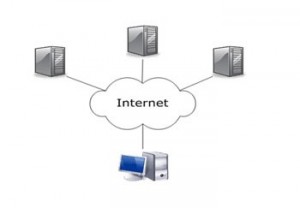First in a series
It’s getting pretty hard to have a conversation about business these days, or to read a business article, without someone mentioning “the Cloud”. So Cloud is the new buzzword, and technology vendors, required by law to be 100% buzzword-compliant, are lining up to tell you about their cloud services.
As someone who works with small businesses on a daily basis, I can assure you that business owners who feel a little confused by all the cloud-talk are not alone. And most of them have the same question: Is this cloud thing a good idea for me and my business?
Time for a reality check.
First of all, “Cloud” is such a broad term, that nearly anything that involves the Internet in the delivery of a service can be labeled a cloud service. So let’s start with some background and define what we mean by cloud services. Then we’ll get into some specific examples, and I’ll talk about how these services can indeed be very useful for a small business.
Where did “the cloud” come from? Did you ever see anyone draw a network diagram, and in the middle of the diagram where the network connects to the Internet, they drew a cloud shape – like this?
That’s it. At some point, someone got tired of saying “an Internet connected server” said something like, “We’re going to send our data to a server up here in the cloud,” and a buzzword was born.
So “Cloud” just means Internet. Cloud software sounds better than “Internet-delivered service” and so the name stuck. But that’s a little too broad a definition to be useful for our purposes, so let’s clarify.

A Definition of Cloud
For our purposes, we’re going to say that if you’re connecting over the Internet to a server computer owned by a 3rd party, and using that server to persistently store data on your behalf and to run software applications that allow you to interact with that data, you’re using a cloud service. That may still be a little vague, so let’s get into some examples.
A few cloud services you might already know
Let’s start with an obvious one that many people don’t give a second thought to. If you’re using an email account from Gmail, Yahoo, Hotmail/MSN/Live Mail/Outlook.com, you’re using a cloud-based email service. They store your mail, send and receive on your behalf, and you connect to their web-based email application to interact with your email. See, you may already be in the cloud and not realize it.
There are countless examples; here are just a few more well-known ones:
- QuickBooks Online – instead of storing your company file locally and running QuickBooks on your computer, you can update your company’s books via the web, no matter where you are. Your accountant needs access? No problem, she can log in from her office and pull a balance sheet report at the same time you’re generating invoices.
- Salesforce.com – one of the original cloud services, even before the term was invented. Manage customer relationships and sales opportunities with a web-based program available from wherever your sales people happen to be.
- Google Apps – a whole suite of applications, including word processing, spreadsheets, presentations, storage, calendars, video conferencing, and more, all online and built for sharing with your team, or with customers, partners, and vendors.
- Office 365 – Microsoft’s all-encompassing suite of email, calendar, contacts, shared storage and collaboration, and online word-processing, spreadsheet, and presentation applications.
A key feature of most cloud services is that you pay as you go. Typically, there is little or no up-front cost in terms of software or hardware that is needed. In many cases, this puts features that used to be limited to large enterprises in the hands of small businesses. It also makes it easy to scale up or down quickly. Turning what used to be capital expenditures into operating expenses can have financial benefits for many companies.
In the next installment, I’ll touch on a few additional examples beyond these, including cloud phone service, data backup, network management, and more, and highlight how they can benefit your business.

Leave a comment!
You must be logged in to post a comment.